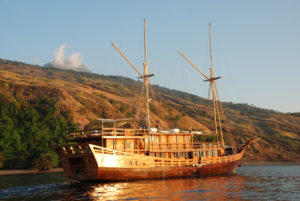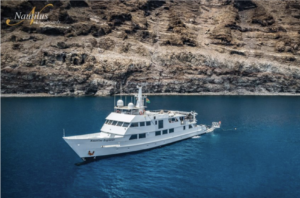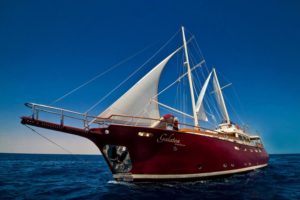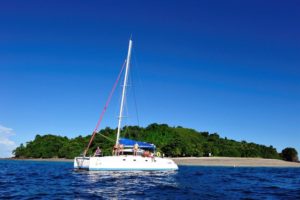Divers have long known that liveaboard diving is one of the best ways to reach remote dive sites and unique destinations, plus conduct the most dives per day. As liveaboard diving continues to grow in popularity, a huge variety of vessels and onboard facilities have become available, with something for all budgets. You might choose a boat based on its appearance or destination, but there are more advantages to the different vessel types than meets the eye. Let’s take a closer look at what you can expect from the top types of liveaboards available today.
Phinisi

The Indonesian Damai phinisi
What is it?
The phinisi — or pinisi — is a traditional Indonesian sailing vessel with a rich history. Phinisi boats are part of Indonesia’s ancient shipbuilding tradition and are usually hand-hewn from exotic and rare woods. They were originally used to carry spices and textiles along the ancient spice route. Modern phinisis have been repurposed for cruising and diving. UNESCO recognizes the importance of phinisis boats and has listed south Sulawesi’s hand-crafted sailing boats as “Intangible Cultural Heritage.”
What are the advantages of phinisis?
The hull shape ensures smooth and easy sailing, allowing guests to relax comfortably and mitigate motion sickness. While these boats have good sailing capabilities, they also have powerful engines to minimize travel time to each safari destination, ensuring guests can make the most of island-hopping and their dive time.
What can you expect from a phinisi liveaboard?
Phinisi boats are a beautiful style of liveaboard and you can expect rich wood interiors, traditional designs and cozy rooms. They sail some of Indonesia’s best waters and are a good choice for romantic liveaboard safaris or relaxing under the sails as you cruise from island to island. There are a variety of phinisi liveaboards to choose from, with safaris ranging from three to more than 10 nights.
Steel hull

The Nautilus Explorer is a well-known steel-hull liveaboard
What is it?
Steel-hull boats are, as the name suggests, made from steel. This is the type of boat most people associate with liveaboard diving. These strong and stable boats visit a variety of top dive destinations around the world and are a popular choice with well-known liveaboard fleets.
What are the advantages of steel-hull boats?
These modern boats are known for their strength and are built to excellent safety standards. They have a variety of safety features, such as compartmentalized hulls, so any unexpected leaks at sea can be easily contained. They are also very stable in choppy waters, with the steel hull and boat design ensuring a comfortable ride even on high seas. They are perfect for reaching remote dive destinations.
What can you expect from a steel-hull liveaboard?
Being modern, you can expect steel-hull boats to have some of the best facilities, spacious rooms and everything a diver could need onboard. They can be high-end safaris, as they are expensive to build, but there are both luxury and budget options available. These sturdy boats reach can remote dive sites easily, allowing divers to get in the water with big pelagics at destinations such as the Socorro Islands and Guadalupe, Mexico — without compromising on comfort at sea.
The Nautilus fleet offers a great example of the diverse facilities available, including onboard open-air cinemas and luxury staterooms. Steel-hull boats also cruise Egypt, French Polynesia, Micronesia and many more destinations.
Sailing yacht

The Galatea in Seychelles
What is it?
Sailing yachts are easy to identify, with sleek designs and billowing sails. While they might not be the first option that comes to mind when you picture liveaboard diving, there are some great reasons to try diving from a sailing yacht.
What are the advantages of sailing yachts?
Sailing yachts are perfect for combining scuba diving, sailing and utter relaxation on the ocean. These boats are spacious and have classy interiors, with plenty of luxurious and modern facilities to choose from. Sailing yachts are ideal for families and groups with non-divers, as they usually combine diving with watersports activities and island hopping. One of the best advantages of diving from a yacht is the chance to slow down, unwind and enjoy a slower pace of life at sea.
What can you expect from a sailing yacht liveaboard?
If you choose a sailing yacht liveaboard you can expect a relaxed vacation, sailing and diving around islands and exploring white-sand beaches. Destinations include Indonesia, Micronesia, the Maldives and Thailand.
The Seychelles is a popular destination for sailing liveaboards and there are plenty of dive sites to choose from while exploring some of the 100 islands on offer.
Catamaran
What is it?

A Madagascar catamaran
Catamarans have two parallel hulls and can function as both motor and sailing yachts. Catamarans have some unique design features that make them ideal for divers who suffer from motion sickness and want to ensure they are comfortable at anchor.
What are the advantages of catamarans?
Catamarans have a shallow draft, allowing them to cruise and anchor in shallow places that few other boats can reach. This design feature allows catamarans to visit quieter dive sites, avoid swells and ensure guests have a good night’s sleep at anchor. They also have fantastic stability and can alleviate seasickness more than monohulled boats can. Catamarans are quiet and can cruise the seas at speed, allowing divers to reach a variety of dive sites while also enjoying the experience of being aboard a sailing boat.
What can you expect from a catamaran liveaboard?
If you join a catamaran trip you can expect an intimate dive safari, as they often cater for smaller groups. Being part of a small dive group allows more flexibility with the dive itinerary and ensures a more personalized service. You can also expect easily-accessible 360-degree views of the ocean from the boat and fun extras, such as onboard trampolines.
Catamaran liveaboards cruise a variety of stunning destinations, including French Polynesia, Madagascar and Western Australia. Other top catamaran destinations include the Bahamas, the Philippines and Myanmar (Burma).
Expedition ship
What is it?
Expedition ships are typically larger ships, often used for both diving and cruising safaris. They are built to withstand all sea conditions and visit some of the harshest destinations on the planet.
What are the advantages of expedition ships?
Expedition ships offer adventurous divers the chance to visit and explore some of the most pristine and untouched environments on earth. These ships can cope easily with icy seas, challenging swells and long crossings, all without compromising guest comfort and entertainment. Expeditions ships are ideal for ice diving, wildlife watching, and nature photography.
What can you expect from an expedition ship liveaboard?
You can expect these ships to accommodate numerous passengers and have plenty of social areas, extensive walking space on deck, and a huge variety of onboard facilities. Expedition ships often have a rich history of scientific research to discover and combine diving, cruising, wildlife watching and activities such as hiking, kayaking remote shorelines, and getting up-close to wildlife. They are ideal for exploring and diving the Arctic and Antarctica.
Divers and writers at LiveAboard contributed this article.
The post Top Types of Liveaboards appeared first on Scuba Diver Life.
from Scuba Diver Life https://ift.tt/2TOeZkw
No comments:
Post a Comment